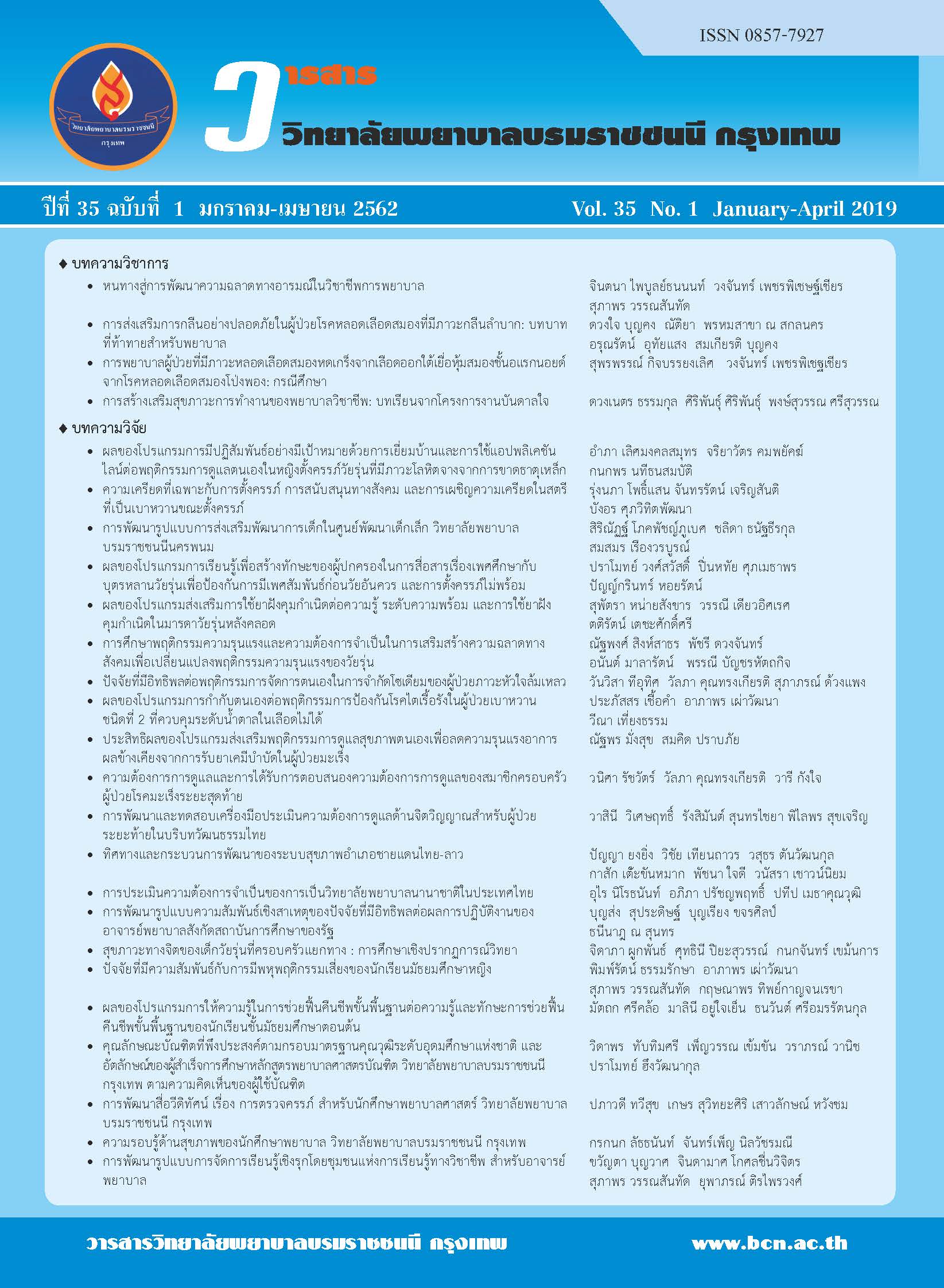การสร้างเสริมสุขภาวะการทำงานของพยาบาลวิชาชีพ: บทเรียนจากโครงการงานบันดาลใจ
คำสำคัญ:
การสร้างเสริมสุขภาวะการทำงาน, พยาบาลวิชาชีพ, งานบันดาลใจบทคัดย่อ
การเสริมสร้างสุขภาวะการทำงานของพยาบาลวิชาชีพเป็นเรื่องที่องค์กรควรคำ นึงถึง เพราะเป็นวิชาชีพที่ต้องทำงานตลอด 24 ชั่วโมง ดังนั้น ผู้บริหารควรมีแนวทางในการสร้างเสริมสุขภาวะการทำ งานของพยาบาลทั้งในระดับองค์กรและระดับ บุคคล แนวทางสร้างเสริมสุขภาวะการทำ งานของพยาบาลวิชาชีพที่เสนอในบทความนี้ได้มาจากการสังเคราะห์ปัจจัยความ สำ เร็จของการสร้างเสริมสุขภาวะการทำ งานของพยาบาลวิชาชีพซึ่งได้รับจากการประเมินโครงการสร้างสุขภาวะใน ระบบบริการสุขภาพด้วยจิตวิญญาณความเป็นมนุษย์ หรือเรียกว่า โครงการงานบันดาลใจที่มุ่งส่งเสริมให้เกิดแนวทางใหม่ๆ สำ หรับการสร้างเสริมสุขภาวะทางจิตวิญญาณในที่ทำ งานในระบบบริการสุขภาพ แนวทางที่ได้สามารถอธิบายได้โดยใช้ ศาสตร์ในสาขาจิตวิทยาเชิงบวก โดยในระดับองค์กรเป็นการกำ หนดแนวทางการส่งเสริมสนับสนุนกิจกรรมการเสริมสร้าง สุขภาวะการทำ งาน 5 กิจกรรม ได้แก่ 1) การสร้างความรู้และทักษะในการวิจัยจากงานเพื่อพัฒนาการทำ งาน 2) การสร้าง สิ่งแวดล้อมการทำ งานอย่างปลอดภัย 3) การสร้างความรักงานและองค์กร 4) การสร้างเสริมความเข้มแข็งทางจิต และ 5) การสร้างจิตวิญญาณในการทำ งาน (Workplace Spirituality) สำ หรับแนวทางในระดับบุคคล ให้พยาบาลพัฒนาตนเอง ด้วยแรงขับภายใน ดังนี้ 1) การแก้ปัญหาการทำ งาน 2) การทำความเข้าใจงานและคุณค่าของงาน 3) การดูแลผู้ป่วยด้วยใจ 4) การทำตัวเองให้มีประโยชน์ 5) การสร้างความมุ่งมั่นในการทำ งาน 6) การสร้างความรักในวิชาชีพ เพื่อนร่วมงาน และ องค์กร 7) การฝึกความกล้าเผชิญและรับผิดชอบ ความเด็ดเดี่ยว ความซื่อสัตย์ต่องาน การคิดเชิงบวก และ 8) การสร้าง ทักษะการทำ งานเป็นทีม สิ่งเหล่านี้จะช่วยสร้างเสริมสุขภาวะการทำ งานของพยาบาลวิชาชีพ และเติบโตเต็มศักยภาพ ของความเป็นมนุษย์
Downloads
เอกสารอ้างอิง
2. Srisuphan W, Sawaengdee K. Policy Suggestions to Solve the Problem of Lack of Professional Nurses in Thailand. Thai Journal of Nursing Council; 2012;27(1):4-12. (in Thai).
3. Khunthar A. The Impacts and Solutions to Nursing Workforce Shortage in Thailand. Journal of Nursing Science. 2014;32(1):81-90. (in Thai).
4. Chuengsatiansup K. Promoting Humanity and Spiritual Well-being in Healthcare (Inspiration at Work). Social and Health Institute. Nonthaburi; 2014.
(in Thai).
5. Geounuppakul M, Tounprommarat O, Pienpicharn A. Factors Influence Happiness of Personnel Working at Borommarajonnani College of Nursing, Bangkok, Thailand. Journal of Boromarajonnani College of Nursing, Bangkok. 2009;25(1):4-19. (in Thai).
6. Prapansilp M. Health Promotion for Workers in the Workplace. Textbook Project, Department of Health, Office of Academic Affairs. Nonthaburi: Cyber Press Co., Ltd.; 2000. (in Thai).
7. Kelly M, Wills J, Sykes S. Do nurses’ personal health behaviours impact on their health promotion practice? A systematic review. International Journal of Nursing Studies. 2017;76:62–77.
8. Jung HS, Lee B. Contributors to shift work tolerance in South Korean nurses working rotating shift. Applied Nursing Research. 2015;28:150–5.
9. Panczyka M, Woynarowska-Sołdan M, Zmuda-Trzebiatowska H, Gotlib J. Health-enhancing behaviours of nurses in Poland and their association with shift work and age. Collegian. 2018;25:255–61
10. Trikasemsak P, Wivatvanit S. Factors predicting health status of professional nurses in Tertiary Care Hospital, Ministry of Public Health. Journal of Nursing Science Chulalongkorn University. 2012;24(Special Issue):27-38.
11. Zhang Y, Punnett L, McEnany GP, Gore R. Contributing influences of work environment on sleep quantity and quality of nursing assistants in long-term care facilities: A cross-sectional study. Geriatric Nursing. 2016;37:13-8.
12. Thummakul D., Prasertsin U. (2558). Handbook on evaluating for public organization health (pilot – hospital). Nonthaburi: Theerakant Graphic. (in Thai).
13. Thummakul D, Kruttakart S, Cheunsirimongkol J, Thongtanunam Y, Prasertsin U. Confirmatory Factor Analysis of Happy-Public Organization Index: A Pilot Study in Public Hospital. Journal of Research Methodology. 2016;29(3):255-71. (in Thai).
14. Thummakul D, Kruttakart S, Cheunsirimongkol J, Thongtanunam Y, Prasertsin U., Kullaboot S. Development of Operational Training Course for Happy Hospital Developers. Journal of Boromarajonani College of Nursing, Bangkok. 2014;30 (3):1-13. (in Thai).
15. Wei H, Sewell KA, Woody G, & Rose MA. The state of the science of nurse work environments in the United States: A systematic review. International Journal of Nursing Sciences. 2018;Article in Press:1-14.
16. Pan X, Mao T, Zhang J, Wang J, Su P. Psychological capital mediates the association between nurses' practice environment and work engagement among Chinese male nurses. International Journal of Nursing Sciences. 2017;4:378-83.
17. Euphum N. Good Nursing to Development Humanity: Buddhism Perspective. Dhammathas Academic Journal. 2014;14(3):1-21.
18. Sirisoparuk S, Oumtanee A. Experience of Being a Professional Nurse Providing Humanized Care for Patients. Journal of The Royal Thai Army Nurses. 2014;15(2):289-97. (in Thai).
19. Reeda JL, Prince SA, Pipe AL, Attallah S, Adamo KB, Tulloch HE, et al. Influence of the workplace on physical activity and cardiometabolic health: Results of the multi-centre cross-sectional Champlain Nurses’ study. International Journal of Nursing Studies. 2018;81:49–60.
20. Liu H, Zhang X, Chang R, Wang W. A research regarding the relationship among intensive care nurses' self-esteem, job satisfaction and subjective well-being. International Journal of Nursing Sciences. 2017;4:291-5.
21. Rosenberg M. Nonviolent Communication: A Language of Life. (264 pages) 3rd (Ed.). Encinitas, CA: Puddle Dancer Press; 2015.
22. Priano SM, Hong OS, Chen JL. Lifestyles and Health-Related Outcomes of U.S. Hospital Nurses: A Systematic Review. Nursing Outlook. 2018;66(1):66-76.
23. Limsungnoen S., et al. Promote Health Care for the Elderly Desirable Social Group by Participation
of village health volunteers, Thai Samakkhi Tambon, Nong Hong District, Buriram Province, Thailand.
Research Report of Health Promotion Hospital, Thai Samakkhi Tambom; 2013. (in Thai).
24. Seligman MEP, Csikszentmihalyi M. Positive psychology. An introduction. American Psychologist.
2000;55(1):5-14.
25. Seligman MEP, Steen TA, Park N, Peterson C. Positive psychology progress: empirical validation
of interventions. American Psychologist. 2005;60(5):410-21.
26. Wright TA. Positive organizational behavior: an idea whose time has truly come. Journal of
Organization Behavior. 2003;24(4):437-42.
27. Paul H, Garg P. Healing HRM through positive psychology: An outlook. Procedia-Social and
Behavioral Sciences. 2014;133:141–50.
28. Seligman MEP. Flourish: A visionary new understanding of happiness and well-being. New York: Atria Books; 2011.
29. Kintarak S, Phattharayuttawat S, Manusirivithaya V. The Effect of Psychological Training Program on Self-esteem. Journal of the Psychiatric Association of Thailand. 2015;60(1):49-57. (in Thai).
30. Hassan M, Nadeem AB, Akhter A. Impact of workplace spirituality on job satisfaction: Mediating effect of trust. Cogent Business & Management. 2016;3(1):1-15.
31. Charoensukmongkol P, Daniel JL, Jardon RC. The Contribution of Workplace Spirituality to Organizational Citizenship Behavior. Advances in Business Research. 2015;6:32-45.
ดาวน์โหลด
เผยแพร่แล้ว
รูปแบบการอ้างอิง
ฉบับ
ประเภทบทความ
สัญญาอนุญาต
บทความที่ได้รับการตีพิมพ์ เป็นลิขสิทธิ์ของวารสารวิจัยสุขภาพและการพยาบาล (วิทยาลัยพยาบาลบรมราชชนนี กรุงเทพ) ไม่สามารถนำไปตีพิมพ์ซ้ำในวารสารฉบับอื่น


















